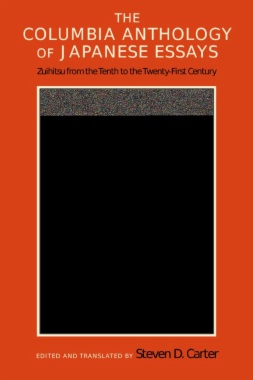A court lady of the Heian era, an early modern philologist, a novelist of the Meiji period, and a physicist at Tokyo University. What do they have in common, besides being Japanese? They all wrote zuihitsu—a uniquely Japanese literary genre encompassing features of the nonfiction or personal essay and miscellaneous musings. For sheer range of subject matter and breadth of perspective, the zuihitsu is unrivaled in the Japanese literary tradition, which may explain why few examples have been translated into English.
The Columbia Anthology of Japanese Essays presents a representative selection of more than one hundred zuihitsu from a range of historical periods written by close to fifty authors—from well-known figures, such as Matsuo Basho, Natsume Soseki, and Koda Aya, to such writers as Tachibana Nankei and Dekune Tatsuro, whose works appear here for the first time in English. Writers speak on the experience of coming down with a cold, the aesthetics of tea, the physiology and psychology of laughter, the demands of old age, standards of morality, the way to raise children, the Great Kanto Earthquake of 1923, the thoughts that accompany sleeplessness, the anxiety of undergoing surgery, and the unexpected benefits of training a myna bird to say "Thank you." These essays also provide moving descriptions of snowy landscapes, foggy London, the famous cherry blossoms of Ueno Park, and the appeal of rainy vistas, and relate the joys and troubles of everyone from desperate samurai to filial children to ailing cats.
- Table of Contents
- Acknowledgments
- Introduction
- Part I. Beginnings
- 1. The Pillow Book, by Sei Shonagon
- 2. Essays in Idleness, by Yoshida no Kenko
- Part II. The Late Medieval Era
- 3. Conversations with Shotetsu, by Shotetsu
- 4. “To Unify the Nation and Restore Civil Society”, by Ichijo Kaneyoshi
- 5. “Cottage of Dreams” and “Three Loves”, by Shohaku
- 6. A Tenbun Miscellany, by The Fujiwara Lay Monk
- Part III. The Edo Period
- 7. Laughs to Keep You Awake, by Anrakuan Sakuden
- 8. “On Ohara”, by Kinoshita Choshoshi
- 9. Haikai Prose, by Matsuo Basho
- 10. Amusements, by Amenomori Hoshu
- 11. Window Musings, by Matsuzaki Kanran
- 12. A Miscellany of Stories, by Morita Morimasa
- 13. Chats with Myself, by Dazai Shundai
- 14. Jeweled Comb Basket, by Motoori Norinaga
- 15. Idle Chats Beneath a Northern Window, by Tachibana Nankei
- 16. Blossoms and the Moon, by Matsudaira Sadanobu
- 17. Year by Year: A Miscellany, by Ishiwara Masaakira
- 18. Behind the Koto, by Murata Harumi
- 19. Shunparo’s Jottings, by Shiba Kokan
- 20. Unusual People of the Modern Age and Kanden’s Crop of Jottings, by Ban Kokei
- 21. Hoary Stories, by Tadano Makuzu
- 22. Haikai Prose, by Natsume Seibi
- 23. Clouds of Floating Grasses
- Part IV. The Modern Period
- 24. Autumn Ensemble, by Higuchi Ichiyo
- 25.
Short Works from Long Days, by Natsume Soseki
- 26. “Snow”, by Tokutomi Roka
- 27. “Desk”, by Tayama Katai
- 28. “Fireworks”, by Nagai Kafu
- 29. “Laughter”, by Terada Torahiko
- 30. “Various Thoughts on the Great Kanto Earthquake” and “My Moral Precepts for Everyday Life”, by Kikuchi Kan
- 31. “Master Hyakken’s Idle Fantasies,” “Bumpy Road,” and “A Long Fence”, by Uchida Hyakken
- 32. “The Image of an Author”, by Dazai Osamu
- 33. “Baby Sparrow,” “Turtledoves,” and “Morning Glories”, by Shiga Naoya
- 34. Esprit and Humor, by Kawamori Yoshizo
- 35. “Sleepless Nights” and “A Bed for My Books”, by Osaragi Jiro
- 36. “On Being Down with a Cold”, by Kawakami Tetsutaro
- 37. “The Road”, by Shono Junzo
- 38. “Kitchen,” “Raindrops,” and “A Memento of the Season”, by Koda Aya
- 39. “On Surgery” and “Rainy Day”, by Kono Taeko
- 40. “Looking for Gloves”, by Mukoda Kuniko
- 41. One, We Count, Then . . . , by Takenishi Hiroko
- 42. Sunday Musings, by Hiraiwa Yumie
- 43. Not Much of a Book, but Please . . . and Just Be Sure You're Not a Bother to Anyone, by Dekune Tatsuro
- 44. “Myna Bird”, by Kizaki Satoko
- 45. “Concerning the Order of Culture”, by Shiroyama Saburo
- 46. “On Zuihitsu”, by Sakai Junko

